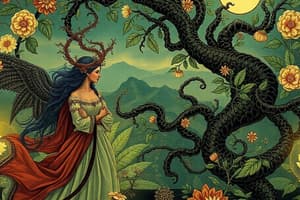Podcast
Questions and Answers
Match the following literary terms with their definitions:
Match the following literary terms with their definitions:
Point of view = The perspective from which a story is told Suspense = The feeling of uncertainty and excitement about what may happen next Conflict = The struggle between opposing forces in a story Macabre = A style of literature that emphasizes the gruesome and horrific
Match the following literary movements with their characteristics:
Match the following literary movements with their characteristics:
Romanticism = Emphasis on emotion and individualism Epic poem = A lengthy narrative poem, typically detailing heroic deeds Characterization = The process of creating and developing a character Theme = The central idea or message conveyed in a work of literature
Match the following character types with their descriptions:
Match the following character types with their descriptions:
Round character = A complex character with many traits Flat character = A simple character lacking depth Direc characterization = The author explicitly describes the character's traits Indirect characterization = The character's traits are revealed through actions and dialogue
Match the following elements of storytelling with their roles:
Match the following elements of storytelling with their roles:
Signup and view all the answers
Match the following terms with their literary contexts:
Match the following terms with their literary contexts:
Signup and view all the answers
Study Notes
Literary Terms Overview
- Point of View: The perspective from which a story is told, influencing how events and characters are perceived.
- Suspense: A heightened sense of anticipation and tension that keeps readers engaged, often resulting from uncertainty about the outcome.
- Conflict: The struggle between opposing forces, which can be internal (within a character) or external (between characters or between a character and society).
Specialized Concepts
- Macabre: A genre element that evokes horror and the grim; often involves death and the supernatural.
- Romanticism: An artistic and intellectual movement from the late 18th to the mid-19th century emphasizing emotion, individualism, and nature over reason and industrialization.
- Epic Poem: A lengthy narrative work often centered on heroic deeds and events significant to a culture or nation.
Character Representation and Development
- Characterization: The method by which an author develops character personalities and traits through descriptions, actions, and dialogues.
- Theme: The central idea or message in a work, often exploring universal concepts and moral questions.
- Mood: The atmosphere or emotional setting of a piece, often evoking specific feelings in the reader.
Types of Characterization
- Direct Characterization: The author explicitly describes a character's traits and qualities, providing clear insights into their personality.
- Epic Hero: A central character in an epic poem, often possessing superhuman traits and embodying the values of their culture.
- Round Character: A well-developed character with complex traits and layers, often portraying realistic human qualities.
Character Types
- Flat Character: A simplistic character with few distinguishable traits; often used as a supportive role in the narrative without significant development.
- Plot: The sequence of events and actions in a story, driving the narrative forward.
Indirect Characterization
- Indirect Characterization: Revealing a character’s personality through their actions, thoughts, dialogue, and interactions with others, allowing readers to make inferences.
Studying That Suits You
Use AI to generate personalized quizzes and flashcards to suit your learning preferences.
Description
Test your knowledge on crucial literary terms such as point of view, conflict, and romanticism. This quiz covers various concepts that are essential for understanding literature, including characterization and theme. Perfect for students and literature enthusiasts alike!




